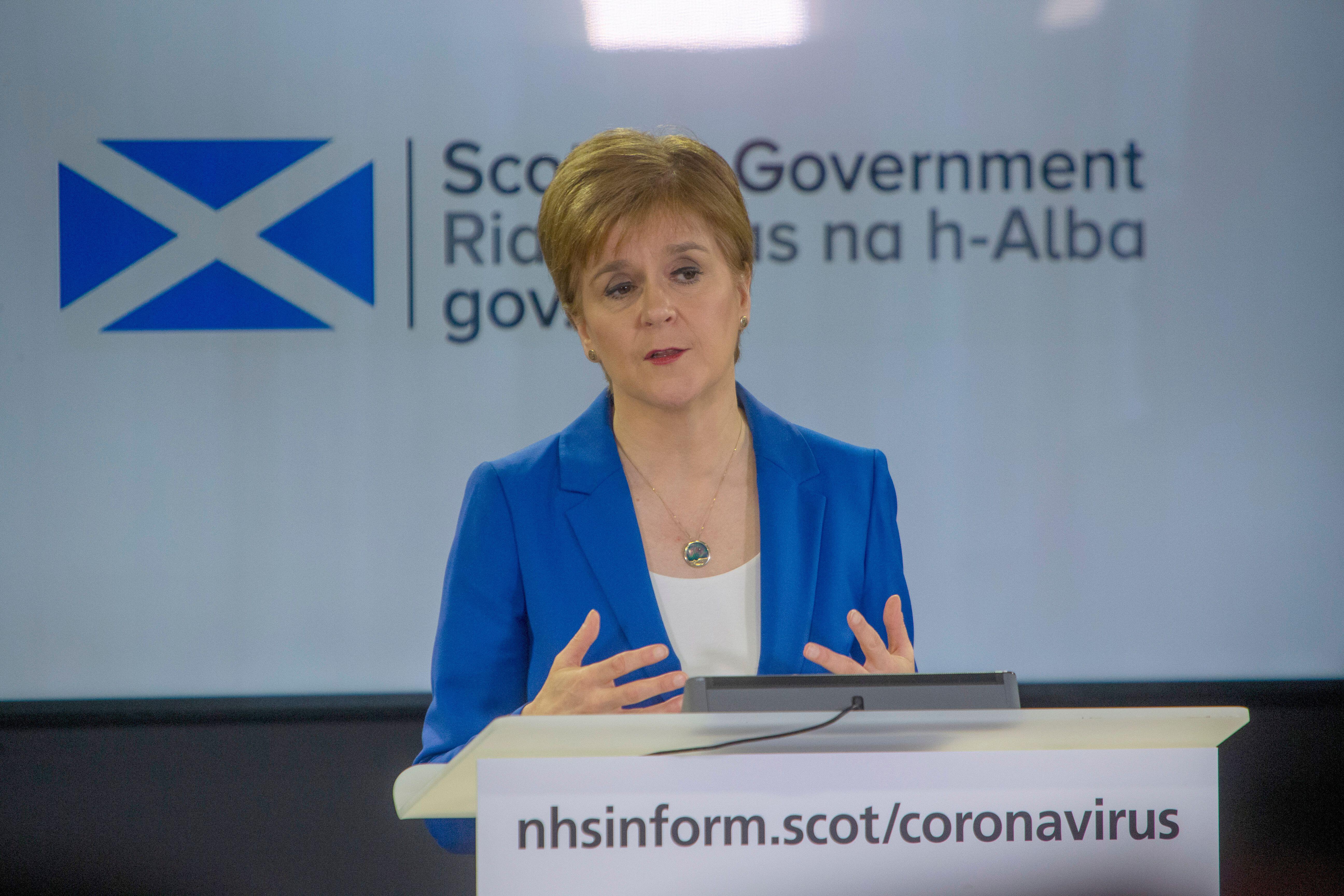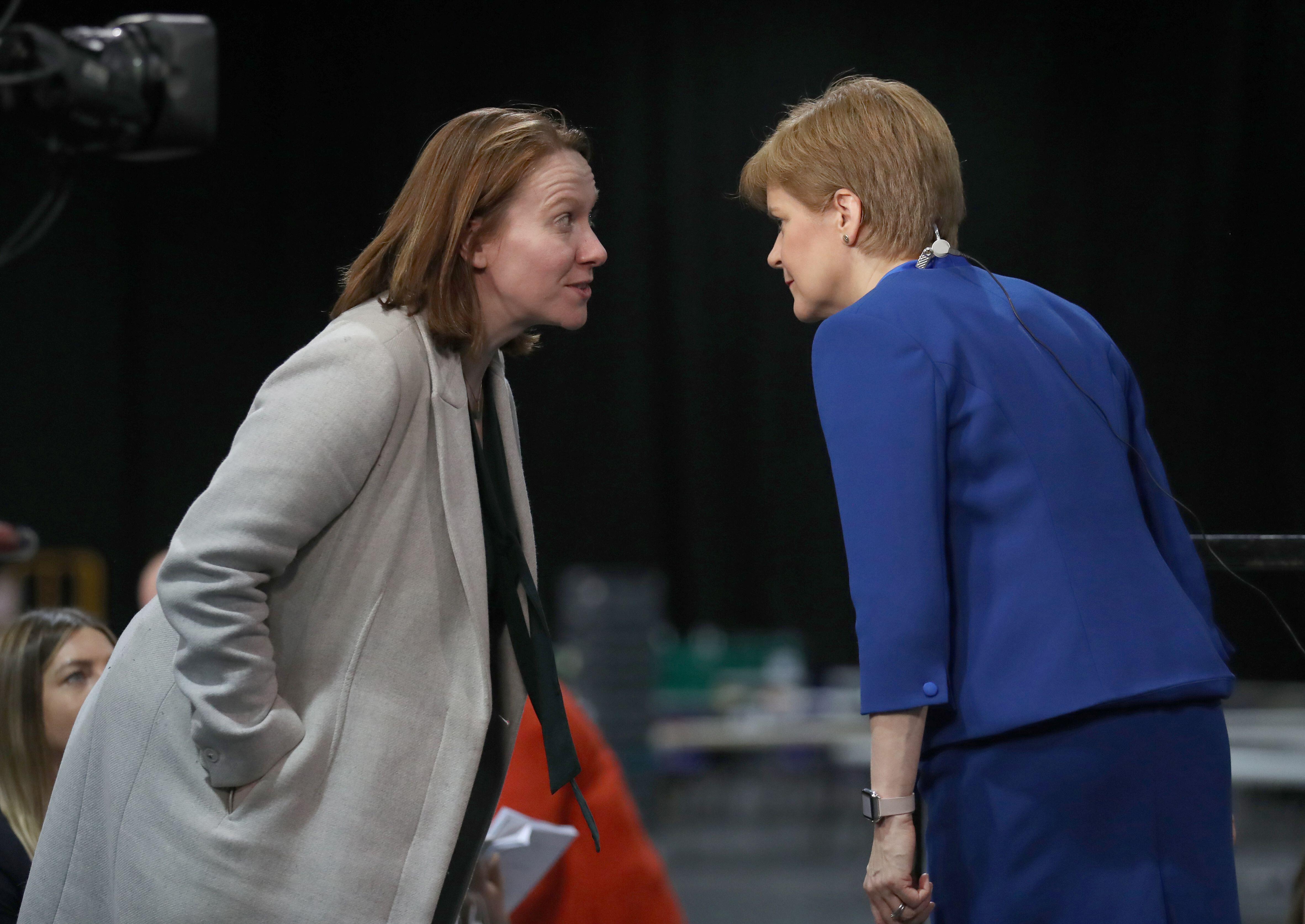The mask slips: Nicola Sturgeon put secrecy at the heart of Scotland's Covid response
More than 200,000 people died in the UK during the pandemic, an epochal event which at its height was routinely compared to the Second World War. And yet while not officially over, for those lucky not to have lost a loved one or to have suffered any long-term health complications, life has returned largely to normal. Yes, the NHS is on its knees, and many continue to suffer the debilitating effects of long Covid. But for a crisis which claimed millions of lives around the globe and placed the strictest restrictions on personal freedom any of us have ever known, Covid-19 has arguably done little to reshape our politics.
The same cannot be said for the careers of our politicians. Boris Johnson, the prime minister who initially played down the seriousness of Covid before almost succumbing to the virus, is gone, his premiership ended by partygate. Matt Hancock, the health secretary and reality TV show contestant described as a “proven liar” by former prime ministerial aide Dominic Cummings, quit after breaking social distancing guidance while having an affair with a colleague. Cummings, who famously took a drive to Barnard Castle to test his eyesight, also memorably described the rest of Hancock’s government colleagues as “useless fuckpigs”.
In Scotland the situation was different, however. While the UK Cabinet appeared stuffed full of useless chancers, the worst possible people in charge at the worst possible time, in Edinburgh we had a first minister steeped in public service who wore her responsibility heavily – something she never tired of telling us. While Westminster was a clown show, at Holyrood the adults were in charge. At least that’s what they wanted us to think.
Nearly four years on, the fear felt during the early days of the pandemic is thankfully a distant memory for most of us. It was a surreal time when we panic-bought toilet rolls while shocking TV news reports showed patients hooked up to ventilators in overcrowded hospital wards. Those early months in particular were a fretful time, made all the more anxious by restrictions which effectively made many of us prisoners in our own homes.
Early in the pandemic, Nicola Sturgeon began giving daily media briefings about Covid and the Scottish Government’s response. Many people found these briefings a useful way of keeping up to date with a fast-moving and worrying situation. But to her critics, this was Sturgeon at her worst, using a public health crisis to grandstand and grow her own personal brand. In light of what we now know, it’s hard not to think they were right.
Earlier this month it emerged that contrary to previous assurances given by the former first minister, she had indeed deleted WhatsApp messages from the pandemic. When asked by Channel 4 journalist Ciaran Jenkins in August 2021 whether she would hand over all communications to the Covid public inquiry, including WhatsApps, a decidedly tetchy Sturgeon said: “I think if you understand statutory public inquiries you would know that even if I wasn’t prepared to give that assurance – which for the avoidance of doubt, I am – then I wouldn’t have the ability. This will be a judge-led, statutory public inquiry.”

But while sitting in Scotland earlier in January, the UK public inquiry heard the former first minister had apparently “retained no messages whatsoever”. Jamie Dawson KC, counsel to the inquiry, said that in a response received from the Scottish Government in October summarising the retention of messages and other forms of communication by ministers, the entry for Sturgeon indicated no such messages had been retained.
Questioning senior civil servant Lesley Fraser, Dawson said: “What that tends to suggest is at the time that request was made Nicola Sturgeon, the former first minister of Scotland, had retained no messages whatsoever in connection with her management of the pandemic.” Fraser agreed.
To her critics, this was Sturgeon at her worst, using a public health crisis to grandstand and grow her own personal brand. In light of what we now know, it’s hard not to think they were right
There were yet more damaging revelations for the government that same day, including the news former deputy first minister John Swinney set his messages to ‘auto-delete’ and that national clinical director Jason Leitch had told retired civil servant Ken “plausible deniability” Thomson that WhatsApp deletion was a “pre-bed ritual”.
Amid a predictable slew of damaging front page headlines the following day, Sturgeon attempted to get back on the front foot, releasing a statement in which she said the inquiry had “messages between me and those I most regularly communicated with through informal means”. The former first minister went on to say she had conducted the Covid response through “formal processes” and not through “WhatsApp or any other informal messaging platform”.
It’s perhaps a sign of how far the former FM’s star has fallen since she left office that her statement was met with a sceptical response from those left bereaved by the pandemic. Families fighting for justice for their loved ones instructed their lawyers to prepare a criminal complaint, while the Scottish Information Commissioner said he was continuing to monitor the Covid inquiry amid what he called “deeply concerning” evidence.
Sturgeon says she didn’t make decisions about the pandemic on WhatsApp, but it’s clear from the evidence given by her former chief of staff, Liz Lloyd, that she did and that decisions were often made for purely political reasons, often just to be seen to be doing something different from the UK Government.
It’s all hugely damaging for her successor in Bute House. In recent weeks, Humza Yousaf has begun to look cursed, assailed by negative headlines both of his own and others’ making. There was the first minister’s failure to sack Michael Matheson after he ran up an £11,000 data roaming bill; the health secretary initially expected taxpayers to pay for it and later lied to journalists on the matter. Yousaf’s government was then forced into an embarrassing U-turn on XL Bullies after initially refusing to follow Westminster’s lead on bringing in new restrictions, only to be met with an apparent influx of the dangerous dogs over the border.
Then it emerged Yousaf had extended an invite to controversial Turkish President Recep Tayyip Erdoğan, something which riled his usually pliant Green partners in government. Government officials had earlier urged caution over Yousaf’s wife, Nadia El-Nakla, speaking at the One Heart for Palestine event in Istanbul alongside the spouses of leaders from Qatar, Turkmenistan and Libya. When he did look sure-footed on something, namely promising a mass exoneration for Scots caught up in the Post Office Horizon scandal, he was later contradicted by the lord advocate who said the situation would be handled on a case-by-case basis.
Amid all that there was the unwanted attention that came with the court appearance of his brother-in-law Ramsay El-Nakla for allegedly dealing heroin. El-Nakla was also arrested in connection with an incident in which a man fell from a Dundee window and later died.
Yousaf has already faced his own questions about what he did with his communications from the pandemic. In November, he was accused of misleading parliament after a response he gave about the handing over of government WhatsApp messages to the UK inquiry was later contradicted by his deputy, Shona Robison. Yousaf had told MSPs the inquiry first asked for the messages in September, but responding to a parliamentary question Robison said there had been an explicit request made back in February.
At First Minister’s Questions on 2 November, he said: “I can give an unequivocal guarantee to those families who have been bereaved by Covid that the messages we have retained will absolutely be handed over and handed over in full. As first minister, as the head of this government, I will – when submitting my statement – be handing over my messages in full and unredacted.”
The key phrase there is “messages we have retained” because it’s clear from the hearings of the public inquiry that deletion took place on an industrial scale. The government’s current policy on mobile messaging apps is that conversations be deleted at least once a month, with all important information transcribed and recorded into an email or text document and then saved.

Giving evidence last week, the first minister gave an “unreserved apology” to both the inquiry and the families of the bereaved for the way the government had dealt with WhatsApps. He had earlier told parliament it was not his government’s “finest hour”. The first minister said he had asked for a externally led review into the use of mobile messaging apps.
Like his former boss, he had also attempted to delete old messages but they later surfaced on another handset after he logged out and back into this account, a “fortuitious discovery” according to the counsel to the inquiry.
In his evidence to the inquiry, Leitch said the comment he had made in a WhatsApp group about the daily deletion of messages had been “flippant”. “It was a flippant exaggeration in an informal messaging group – it [deletion] wasn’t done every night before I went to bed.”
Nevertheless, the national clinical director made it clear that he routinely deleted messages “in line with Scottish Government guidance”. And it was clear from his evidence that significant decisions were discussed on WhatsApp, such as when the group ‘Star Chamber’ considered which Covid tiers to put different areas of the country in. In a text message exchange, Leitch discussed with Sturgeon what action to take after Aberdeen players breached restrictions in August 2020 by visiting a bar. When then health secretary Yousaf sought guidance about mask wearing ahead of a dinner in November 2021, Leitch told him to “have a drink in your hands at ALL times”. The national clinical director said any significant decisions or advice would be placed in the government’s corporate record before the messages were deleted.
Leitch was asked by the counsel to the inquiry whether he was confident he had interpreted the Scottish Government’s records management guidance correctly. Might he have deleted information that should have been kept? “I have followed the Scottish Government guidance and my interpretation of it is correct,” the national clinical director said. But Labour had heard enough; the party’s deputy leader, Jackie Baillie, called for Leitch’s resignation in the parliament later that afternoon.
It’s clear from what we’ve heard so far from the inquiry that the Scottish Government always had one eye on the future. Indeed, Cabinet papers from June 2020 show ministers discussed how “arguments reflecting the experience of the coronavirus crisis” could be used to boost support for independence just hours before a daily media briefing in which Sturgeon denied she would ever do such a thing.
Even at the start of the pandemic when things were at their bleakest, those in senior positions were already looking ahead to a potential public inquiry and the prospect of being called to account for the decisions being made. The WhatsApp chats which have been provided to the inquiry are peppered with references to being “discoverable” under Freedom of Information laws and the need to delete, delete, delete.
Under the 2005 Inquiries Act, it is a criminal offence to intentionally suppress, conceal or destroy documents that are relevant to a public inquiry. The question for the Covid inquiry, which was first announced in May 2021, will be to determine how much of the material that was deleted would have been useful in its deliberations and whether there was a deliberate strategy in place to frustrate its work.
It is now clear that the culture of secrecy which has long pervaded everything the SNP does in government was also a key feature of the Scottish Government’s response to the pandemic. Civil servants and unelected advisers were well drilled when it came to the importance of deleting candid exchanges or avoiding discussion of anything which could later be unearthed in a Freedom of Information request. It begs the question of just how damaging it might have been to hold onto some of this stuff given the perception created by its mass deletion.

When journalists uncovered stories about Sturgeon or Leitch’s WhatsApp messages, the first instinct of the government was to deflect or attempt to discredit. In ‘background information’ provided to reporters after The Times scoop about Leitch deleting his messages, published in October, the government said “it is not correct to suggest the national clinical director deleted every WhatsApp message every day”.
And when the Sunday Mail reported in October that Yousaf had deleted his messages, the first minister denied it.
It remains to be seen just how damaging the inquiry and its Scottish counterpart are to the SNP but the anger is already growing, not least among the bereaved families seeking answers for what happened to their loved ones. It seems a very long time indeed since Sturgeon went into the 2021 Holyrood election urging those agnostic about the prospect of Scottish independence to back her based on her record of handling the pandemic.
Right at the outset, Sturgeon instinctively knew her handling of the pandemic would come to define her time in office. If Johnson was famously not a “details man”, she would be his polar opposite, a serious politician who would work night and day to keep Scotland safe. Yet in the final analysis, Scotland’s death rates were close to those south of the border – around three per cent above normal. If the presentation was different, the result was remarkably similar.
Speaking outside the inquiry in Edinburgh last week, Elaine Johnston, whose brother Robert Dorrian died of Covid in hospital in February 2021, reflected on watching Sturgeon’s daily media briefings at the height of the pandemic. “I kept thinking, thank God we’re not in England; thank God we’ve got her telling the truth. I’m absolutely ashamed and devastated to hear what she’s doing now.”
The former first minister will give evidence to the inquiry this week, her credibility badly damaged in the 10 months since she left office not least because of the ongoing police investigation into the SNP’s finances. She has promised to answer the inquiry’s questions “directly and openly”. All the evidence to date shows we’re entitled to be sceptical about that.
Holyrood Newsletters
Holyrood provides comprehensive coverage of Scottish politics, offering award-winning reporting and analysis: Subscribe